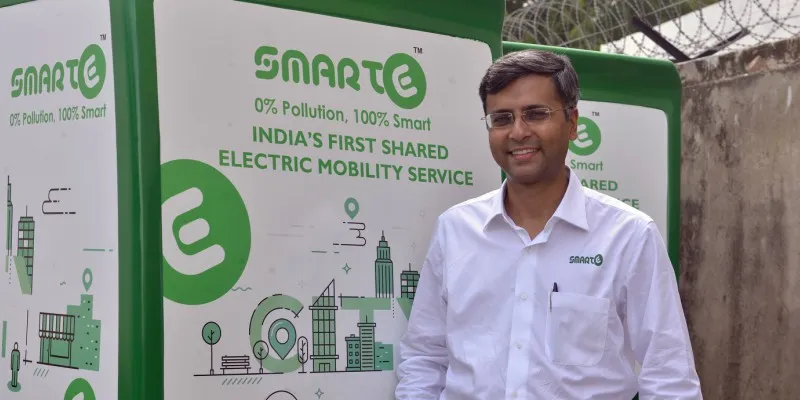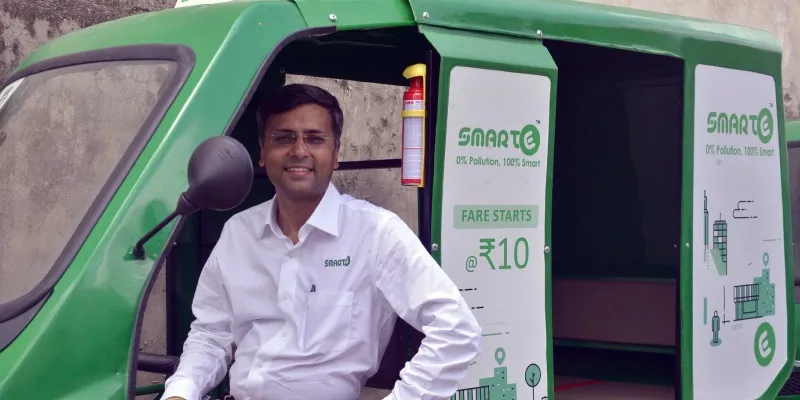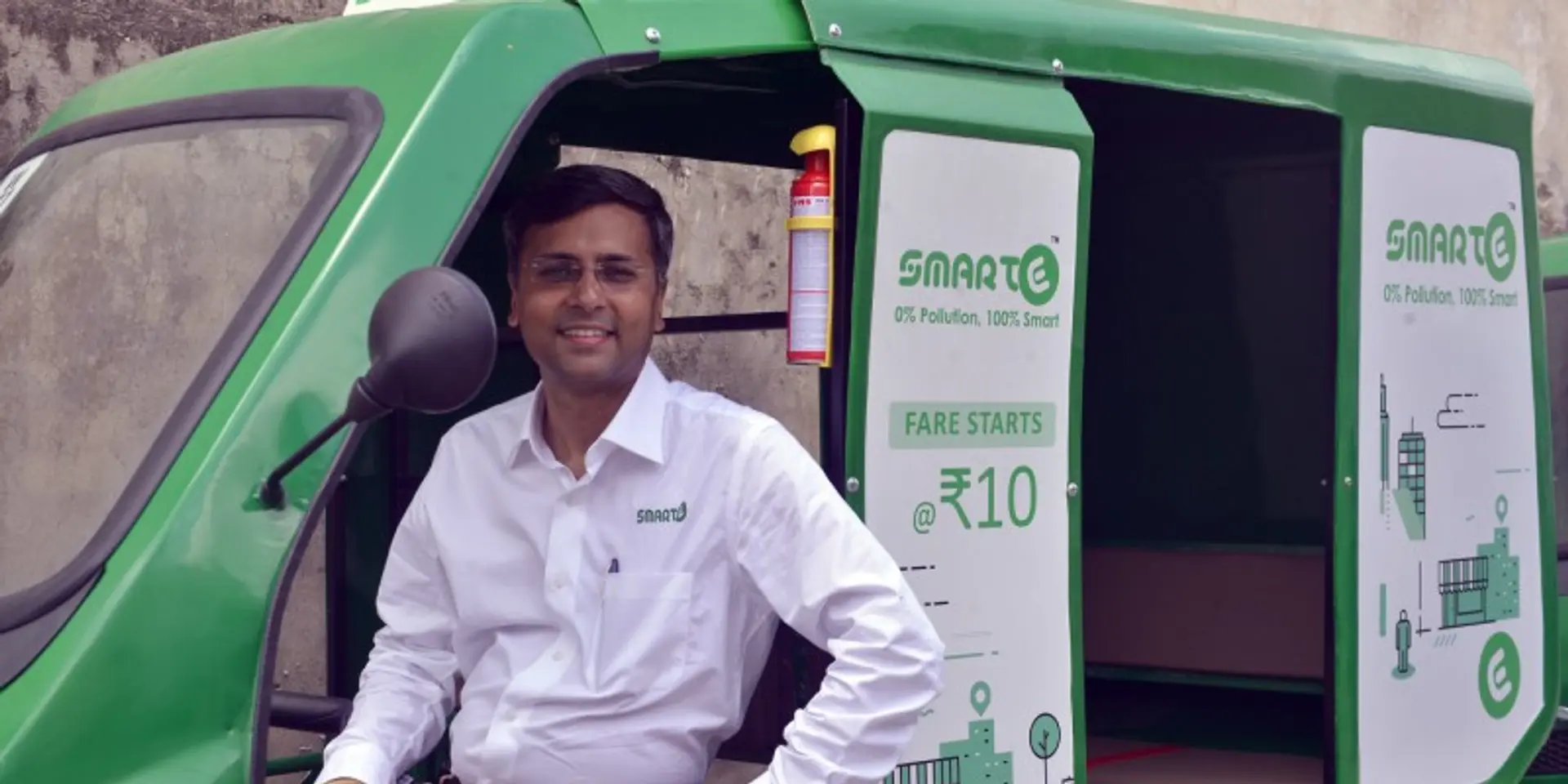How Make in India startup SmartE is transforming the last-mile commute
E-rickshaw company SmartE is trying to fulfil the need for safe, reliable, and economical last-mile connectivity. The company aims to get over 100,000 e-rickshaws on the road by 2022.
Startup: SmartE
Founder: Goldie Srivastava
Year it was founded: 2014
Sector: Transportation
Funding raised: $5 million
Based out of: Delhi
The alarm wakes you up with a jolt. You realise that you have hit the snooze button way too often, and it is now 8 am. You can rush to get ready and finish your bowl of muesli, and know that all you need to do is book a cab to take you to the metro. But there are two problems: Delhi’s traffic, and the availability of a cab to get to the metro station.
Most people in Delhi use the metro as it is high on comfort, convenience, and time consumed. And yet, one of the biggest drawbacks of this public transport system is last-mile connectivity. Keeping the strong need for safe, reliable, and economical last-mile connectivity options in mind, Goldie Srivastava started SmartE - an e-rickshaw service currently plying in the Delhi-NCR region - in October 2015.
While there are feeder services that have become synonymous with last-mile connectivity, the options in India are limited. Also, the options for easy availability, frequency, cost and time taken to move from one point to the next is a challenge.
SmartE not only aims to solve last-mile connectivity, but also wants to deal with other important aspects such as commuter safety, reduced pollution, and empowerment of people from lower socio- economic backgrounds.

Building the ecosystem
Goldie and a few of his friends had conceptualised SmartE in 2014. “The idea was to address three major issues that all major cities in the country face - lack of safe, reliable, and economical last-mile connectivity options,” Goldie says.
He says there is also massive pollution impact due to cities adding large number of diesel/petrol vehicles and the issue of financially sustainable and dignified livelihoods. His idea was to create a platform of over 100,000 all-electric vehicles or e-rickshaws, which can offer over three billion rides and create livelihood for over 150,000 youth in the country by 2022.
In October 2015, a year after the amendment to the Central Motor Vehicles Act, SmartE was piloted in West Delhi’s Paschim Vihar neighbourhood with a team of 30 enterprising women as drivers. Run on a ride-share model, it provided feeder services to passengers travelling to and from metro rail stations.
SmartE first tied up with Goenka Electric Company, a Delhi-based small electric vehicle company. It has now tied up with Kinetic Green. The company procures the vehicles for Rs 1.5 lakh each. The vehicles are customised as per the company’s need and requirements.
“We launched with a 30-vehicle operation more than two years ago. We used to move about 2,000 customers on a daily basis back then. Today, we move over 40,000 commuters on a daily basis. The company operated on a very solid unit economics and was profitable for the financial year 2017,” Goldie says.
SmartE has seen a 20x growth in their fleet size and 15x growth in their rides. The team now has over 650 vehicles and will reach the 1,000-vehicle mark by next month.
Setting up the infrastructure
The company works on an hybrid model. SmartE started out with a model where it didn't own the asset and would work in collaboration with banks where loans are arranged for the e-rickshaw drivers to buy the vehicle.
However, the drivers pay SmartE an operating commission that takes care of infrastructure issues such as dedicated parking and charging stations for the vehicles, as well as help with drivers getting their licenses. The vehicles are currently owned and managed by SmartE. The team also trains the drivers.
“Apart from being country’s largest electric vehicle operator today, we are also the largest EV charging infrastructure company. We have built a capacity to charge over 600 vehicles concurrently and are in the process of adding a capacity of another 500 vehicles in the next 60 days. Over the next one year, we are hoping to create a capacity to concurrently charge over 10,000 vehicles across the country – both in a centralised format (bulk charging of vehicles) as well as de-centralised formats (for swapping of batteries),” Goldie says.
The timings of the e-rickshaws are synchronised with metro rail timings to minimise waiting time for commuters. The SmartE operational design of has passenger safety at its core, and at no time can more than four passengers (excluding driver) ride in a vehicle. The fare is affordable – Rs 10 for the first pit stop, and Rs 5 for every kilometre thereafter.
The economic viability, combined with zero emission of harmful pollutants and massive penetration around metro and bus stations, residential colonies and corporate hubs etc., makes the e- rickshaws a smart proposition.
“The vehicles have in-built GPS tracking, sensors, route optimiser, analytics etc., bringing a true smart quotient on to wheels,” says
Goldie. says.“We started our operations in Delhi, and have now expanded to Gurgaon and Faridabad. We will soon be rolling out our service in other cities as well,” he adds.

Growth and numbers
The company claims to have served over 15 million commuters and has registered a 30x overall growth in two years. By 2022, SmartE is poised to save 17 million trees annually and aims to generate over 100,000 jobs while serving over three billion rides annually.
While every startup has its own challenges, for SmartE the challenge in the early days was to get the electric vehicles financed. Then it was getting the right battery technology that could provide a reliable range.
Goldie explains, “We realised that the overall supply chain and EV ecosystem in the country is not adequately matured and we had to grapple with issues regarding vehicle uptime. Over a period of time, as we scaled up, we came across a wide variety of challenges, but we took each of those head-on, thereby creating a solid foundation on which we could grow in the future.”
The SmartE Team
Currently a team of 30, the core team of SmartE has over 40 years of multinational experience between them.
With a B Sc in Physics from Mumbai University, Goldie has a background in media and corporate communications. Over the past 18 years, he has held key leadership roles across several domains such as marketing, public relations, communications, corporate social responsibility as well as journalism. Goldie has worked for IBM, Adobe, and United Technologies.
Prior to SmartE, Goldie was the Director of Communications (Asia-Pacific) at United Technologies Corporation.
The e-rickshaw space
Two years back, SmartE had raised an angel funding round. They have now raised Series A funding of around $5million f from a PE fund based out of Singapore and are currently raising Series B funding of around $15 million to $20 million.
Currently, Delhi seems to be a thriving hub for e-rickshaws. According to a report by Centre of Civil Society, between April 2013 to March 2017 the number of registered e-rickshaws in the city was at 29,123, but the number of unregistered vehicles was more than a lakh.
There are companies like Gayam Motor Works, which is developing a e-rickshaw with a battery swapping system and Li-Ion battery.
However, an Asian Development Bank report states that close to 600,000 electric rickshaws use lead-acid batteries are plying Indian roads. In that sense these players are different.
Differentiation and future plans
“Our key competition is currently the unorganised sector, which thrives on a number of illegal practices, including but not limited to running un-registered, uninsured or even un-approved vehicles. Additionally, the unorganised sector also causes significant drain on the electricity board by illegally drawing power, causing huge losses to the state exchequer,” Goldie says.
He adds that SmartE has built a strong value proposition for its customers. The team provides consumers with safety and reliability and the convenience to book rides using either the app or hailing them down inside metro station premises, due to the partnership with Delhi Metro. It offers predictable pricing, unlike what you see in the unorganised space.
“ A few large app-based aggregators have tried entering into this space but they have been unsuccessful so far since this space also requires significant domain expertise, investments in the charging infrastructure as well as a much more hands-on approach at managing the EV fleet,” Goldie says.
SmartE currently has four supersized electric vehicle charging stations; each of them is 15 to 20 thousand square feet in Delhi-NCR.
“We are building two more which will be available in 60 days. By Next year, we are planning to add between 80 to 100 such stations in eight different cities. By the end of 2019, SmartE aims to roll out 10,000 vehicles; we hope to cross the 100,000 vehicle mark by 2022,” Goldie concludes.



